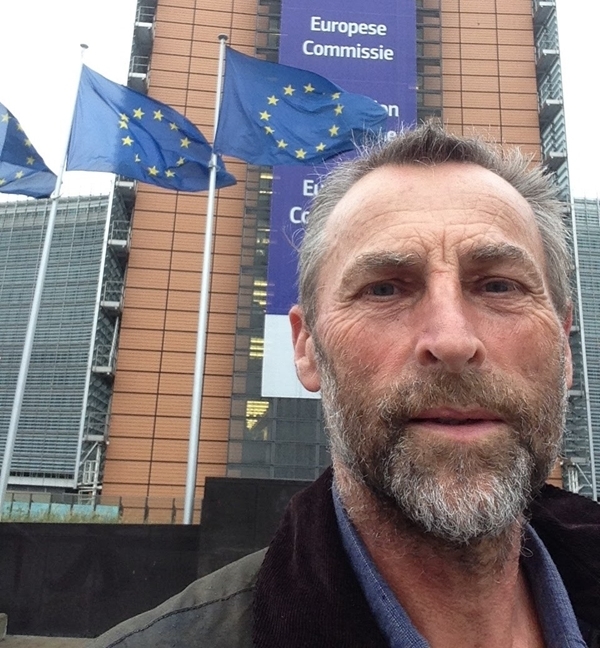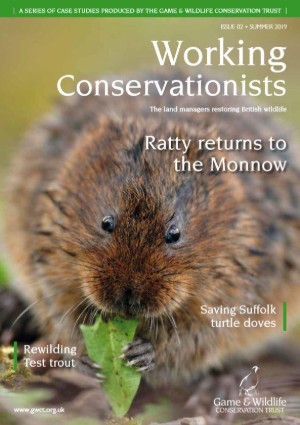By Prof. Chris Stoate, Allerton Project Head of Research
The middle of January this year found me on the ferry to Ireland to give a keynote presentation on our catchment management research in the UK to an audience of EPA and local government staff from across the republic.
It seemed appropriate to be leaving behind the turmoil associated with the first defeat of the government’s EU Withdrawal Agreement Bill the previous day. In April, immediately after the third defeat of the Bill, I found myself travelling to Almeria to report on our contribution to the EU funded SoilCare research project, share ideas, and benefit from the wealth of scientific experience amongst our project partners.

Today, I am writing this on the train, heading back home from an extremely informative meeting in Brussels. A few hundred metres up the road, Boris Johnson was confirming a deal for the UK’s departure from the EU, but whether that will happen continues to remain uncertain. Such is the opposition in the UK to the current version of Brexit that even now it is hard to know whether this has been my last visit to the continent as an EU citizen.
My reason for going to Brussels this time was to learn from a range of EU partners about the latest developments in results-based payments for biodiversity, a topic that may take on heightened relevance as the UK proposes to move from agri-environment schemes that make payments to cover income forgone and costs of habitat creation and management, to one that is based on delivery of services with uncertain rates of remuneration for farmers.
The GWCT pioneered farmer clusters in which farmers take ownership of landscape scale wildlife conservation, incorporating their own initiatives with existing Stewardship schemes as part of their approach. However, as we have discovered in our own landscape scale research, highly motivated pioneering farmers and iconic species on which to focus are not present everywhere.
The results-based approach, alongside conventional management-based approaches to deliver environmental objectives, could well play an important part in rolling out landscape scale wildlife conservation. The broad approach may also have a role to play in achieving wider environmental objectives.
Back in 1999 I was in Brussels from time to time, reporting to the EU Environment Directorate on a commissioned review of environmental impacts of western European arable farming systems, work that found its way into the public domain in the form of a paper in Journal of Environmental Management. A decade later, I led a follow-up paper with various European authors, this time also taking into account grazing livestock systems, and the Eastern European countries which had recently joined the EU.
Drawing on the latest scientific research, including our own, these two papers highlighted the range of environmental issues requiring attention, the opportunities arising from reform of the CAP to develop agri-environment schemes to cover the economic costs of addressing them, and the importance of a Europe-wide but locally relevant approach across the member states.
Environmental issues have become no less important or urgent over the intervening twenty years, with ever increasing scientific evidence and associated concern about biodiversity loss and what is now generally accepted within the scientific community as a climate crisis. The science has been clear throughout that time but is now all the more so.
It is no longer alarmist to say that the future prospects of our own society are inextricably bound up with these enormously complex and integrated global issues. How we manage agricultural land in the next few years has a substantial impact on how things play out, and that is not something that can be done by individual countries in isolation. The UK may be leaving the EU, but whatever happens with Brexit, it will not be leaving Europe.
While increasing emphasis is needed on the environmental objectives for land management, as we stated in our two journal papers, it is imperative that food production is maintained at local and national scales, both to ensure national food security and to avoid exporting negative impacts to other parts of the world. There are strong social, cultural, economic and environmental reasons for not sacrificing UK farm businesses on the Brexit altar.
The development and implementation of effective evidence-based agri-environmental management must also be conducted quickly, drawing on the many experiences of recent projects across Europe, including our own research at the Allerton Project. While the Brexit process may accommodate repeated resetting of deadlines, the environment on which we depend will not.

Our second issue of Working Conservationists, this 40-page A4-size colour publication features eight case studies produced by the GWCT, focusing on the land managers who are helping to save British wildlife.
Buy Now - £3.95 >
eBook - Buy Now - £1.99 >